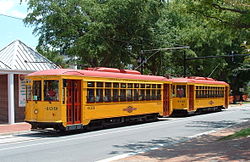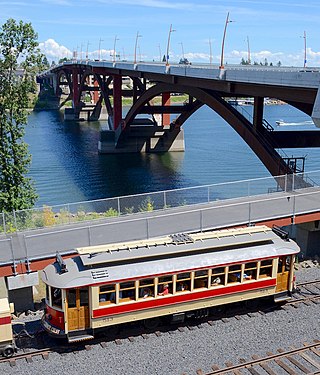
The Willamette Shore Trolley is a heritage railroad or heritage streetcar that operates along the west bank of the Willamette River between Portland and Lake Oswego in the U.S. state of Oregon. The right-of-way is owned by a group of local-area governments who purchased it in 1988 in order to preserve it for potential future rail transit. Streetcar excursion service began operating on a trial basis in 1987, lasting about three months, and regular operation on a long-term basis began in 1990. The Oregon Electric Railway Historical Society has been the line's operator since 1995.

A Birney or Birney Safety Car is a type of streetcar that was manufactured in the United States in the 1910s and 1920s. The design was small and light and was intended to be an economical means of providing frequent service at a lower infrastructure and labor cost than conventional streetcars. Production of Birney cars lasted from 1915 until 1930, and more than 6,000 of the original, single-truck version were built. Several different manufacturers built Birney cars. The design was "the first mass-produced standard streetcar " in North America.

The TECO Line Streetcar is a heritage streetcar transit line in Tampa, Florida, run by the Hillsborough Area Regional Transportation Authority (HART), owned by the city of Tampa, and managed by Tampa Historic Streetcar, Inc. It connects Downtown and Channelside to the historic Ybor City district. There is also an "In-Town" trolley-replica bus system that connects Downtown, Channelside, and Harbour Island.
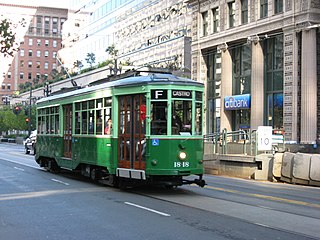
The Peter Witt streetcar was introduced by Cleveland Railway commissioner Peter Witt (1869–1948) who led the transit agency from 1911–1915 and designed a model of streetcar known by his name that was used in many North American cities, most notably in Toronto and Cleveland.

The Charlotte Trolley was a heritage streetcar that operated in Charlotte in the U.S. state of North Carolina. The line ran along the former Norfolk Southern right of way between Tremont Avenue in the Historic South End in a northerly direction to its terminus at 9th Street Uptown. It ran on tracks mostly shared with the LYNX Blue Line.

The Oregon Electric Railway Historical Society (OERHS) is a non-profit organization in the U.S. state of Oregon, founded in 1957. It owns and operates a railroad museum for electric railroad and streetcar enthusiasts, and also operates a separate heritage streetcar line, the Willamette Shore Trolley.
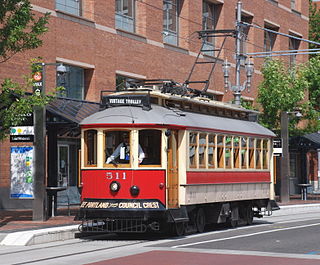
The Portland Vintage Trolley was a heritage streetcar service in Portland, Oregon, United States, that operated from 1991 to 2014. It operated on a portion of the MAX light rail system, and for a brief time also operated on the Portland Streetcar system, in downtown and nearby areas. Service was provided with replicas of a type of Brill streetcar, nicknamed the "Council Crest" cars, which last served Portland in 1950. The service was managed by Vintage Trolley Inc., a non-profit corporation, and the cars were owned and operated by TriMet, Portland's transit agency. For 18 of its 23 years, the service followed a 2.3-mile (3.7 km) section of what is now the MAX Blue Line, between Lloyd Center and the west end of downtown. In September 2009, the route was changed to a 1.5-mile (2.4 km) section of the MAX system, along the transit mall in downtown Portland, from Union Station to Portland State University (PSU).

The M-Line Trolley is a heritage streetcar line in the Uptown neighborhood of Dallas, Texas. The trolley line, which has been in service since 1989, is notable for its use of restored historic streetcar vehicles, as opposed to modern replicas.
The Texas Transportation Company was an electrified, Class III, short-line railroad in San Antonio, Texas, that operated from 1897 until 2001. It served the Pearl Brewery and several other businesses, moving carloads between those businesses and the Southern Pacific yard. Service ended on June 30, 2000, shortly before the Pabst Brewing Company closed the Pearl Brewery, in early 2001.
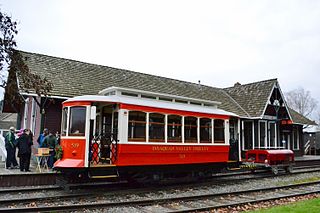
The Issaquah Valley Trolley (IVT) was a heritage streetcar line in Issaquah, Washington, United States. It was a project of the Issaquah History Museums. The IVT operated from the Issaquah Depot Museum building located at 78 First Ave, NE. The service operated on a trial basis in 2001–02 and then on a regular basis, seasonally, from 2012 to 2020.

Streetcars or trolley(car)s were once the chief mode of public transit in hundreds of North American cities and towns. Most of the original urban streetcar systems were either dismantled in the mid-20th century or converted to other modes of operation, such as light rail. Today, only Toronto still operates a streetcar network essentially unchanged in layout and mode of operation.

The Galveston Island Trolley is a heritage streetcar network in Galveston, Texas, United States. As of late 2006, the total network length was 6.8 miles (10.9 km) with 22 stations. The Galveston Island Trolley is operated by Island Transit. The rail system reopened in 2021, after having been out of service for 13 years following severe damage caused by Hurricane Ike in 2008. Subsequent to the 2008 closure, the Federal Emergency Management Agency (FEMA) and the Federal Transit Administration agreed to fund repairs. In January 2017, a contract was approved to restore three of the trolleys at a cost of $3.8 million. At that time, the trolleys were expected to be ready to return to service in 2018, but the date was later postponed to 2019 and later to 2021. By November 2020, two reconditioned trolleys had returned to Galveston. The line reopened for service in October 2021, limited to three days a week for now.

The MATA Trolley is a heritage streetcar transit system operating in Memphis, Tennessee. It began operating on April 29, 1993. Service was suspended in June 2014, following fires on two cars. After nearly four years and repeated postponements, the reopening of the Main Street Line took place on April 30, 2018. The system's two other lines remained suspended as of December 2022, but with reopening of both planned. In 2022, the system had a ridership of 346,700.

The Oregon Electric Railway Museum is the largest streetcar/trolley museum in the Pacific Northwest of the United States. It is owned and operated by the Oregon Electric Railway Historical Society and is located in Brooks, Oregon, on the grounds of Powerland Heritage Park.

Light rail is a mode of rail-based transport, usually urban in nature. When compared to heavy rail systems like commuter rail or rapid transit (subway), light rail systems are typically designed to carry fewer passengers and are capable of operating in mixed traffic or on routes that are not entirely grade-separated. Systems typically take one of four forms: the "first-generation" legacy systems, the "second-generation" modern light rail systems, streetcars, and hybrid rail systems. All of the systems use similar technologies, and some systems blur the lines between the different forms.

The Loop Trolley is a 2.2-mile (3.5 km), 10-station heritage streetcar line in and near the Delmar Loop area of greater St. Louis, Missouri. It opened for service in 2018, then shut down in 2019 after revenue fell far short of projections. Service resumed in 2022 under the Metro Transit division of the Bi-State Development Agency.

The Astoria Riverfront Trolley is a 3-mile (4.8 km) heritage streetcar line that operates in Astoria, Oregon, United States, using former freight railroad tracks along or near the south bank of the Columbia River, with no overhead line. The service began operating in 1999, using a 1913-built streetcar from San Antonio, Texas. As of 2012, the service was reported as carrying 35,000 to 40,000 passengers per year and has been called a "symbol" and "icon" of Astoria. The line's operation is seasonal, normally during spring break and from May through September.
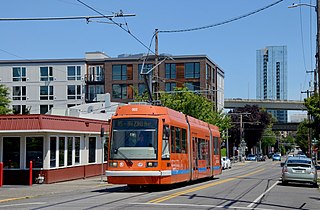
The North South Line is a streetcar service of the Portland Streetcar system in Portland, Oregon, United States. Operated by Portland Streetcar, Inc. and TriMet, it travels approximately 4.1 miles (6.6 km) per direction from Northwest 23rd & Marshall to Southwest Lowell & Bond and serves 39 stations. The line connects Portland's Northwest District, Pearl District, downtown, Portland State University (PSU), and South Waterfront. It runs every day of the week between 15 and 18 hours per day and operates on headways of 15 to 20 minutes.


